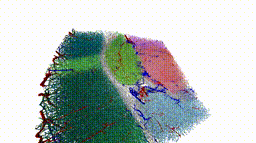# -*- coding: utf-8 -*-
"""
TIF module provides interface to read and write tif image files.
Note
----
This modules relies onf the tifffile library.
"""
__author__ = 'Christoph Kirst <christoph.kirst.ck@gmail.com>'
__license__ = 'GPLv3 - GNU General Pulic License v3 (see LICENSE.txt)'
__copyright__ = 'Copyright © 2020 by Christoph Kirst'
__webpage__ = 'http://idisco.info'
__download__ = 'http://www.github.com/ChristophKirst/ClearMap2'
import tifffile as tif
import ClearMap.IO.Source as src
import ClearMap.IO.Slice as slc
from ClearMap.Utils.Lazy import lazyattr
###############################################################################
### Source class
###############################################################################
[docs]class Source(src.Source):
"""Class to handle a tif file source
Note
----
Its assumed that the image data is stored in a serregionies of the tif file.
"""
def __init__(self, location, series = 0, multi_file = False):
self._tif = tif.TiffFile(location, multifile = multi_file);
self._series = series;
self.multi_file = multi_file;
@property
def name(self):
return "Tif-Source";
@lazyattr
def series(self):
return self._tif.series[self._series];
@property
def shape(self):
return shape_from_tif(self.tif_shape);
@property
def tif_shape(self):
if self._tif._multifile:
return self._tif.series[self._series].shape;
else:
s = self._tif.pages[0].shape;
l = len(self._tif.pages);
if l > 1:
s = (l,) + s;
return s;
@property
def dtype(self):
return self._tif.pages[0].dtype;
@property
def location(self):
return self._tif._fh.path;
@location.setter
def location(self, value):
if value != self.location:
self._tif = tif.TiffFile(value, multifile = False);
@property
def array(self, processes = None):
array = self._tif.asarray(maxworkers=processes);
return array_from_tif(array);
@property
def element_strides(self):
"""The strides of the array elements.
Returns
-------
strides : tuple
Strides of the array elements.
Note
----
The strides of the elements module itemsize instead of bytes.
"""
memmap = self.as_memmap();
return tuple(s // memmap.itemsize for s in memmap.strides);
def __getitem__(self, slicing, processes = None):
ndim = self.ndim;
if ndim >= 3:
slicing = slc.unpack_slicing(slicing, ndim);
slicing_z = slicing[-1];
array = self._tif.asarray(key = slicing_z, maxworkers=processes);
array = array_from_tif(array);
slicing_xy = (Ellipsis,) + slicing[-3:-1];
if len(array.shape) > len(self._tif.pages[0].shape):
slicing_xy = slicing_xy + (slice(None),);
return array[slicing_xy];
else:
array = self._tif.asarray(maxworkers=processes);
array = array_from_tif(array)
return array.__getitem__(slicing);
def __setitem__(self, *args):
memmap = self.as_memmap();
memmap.__setitem__(*args);
[docs] def as_memmap(self):
try :
return array_from_tif(tif.memmap(self.location));
except:
raise ValueError('The tif file %s cannot be memmaped!' % self.location);
[docs] def as_virtual(self):
return VirtualSource(source = self);
[docs] def as_real(self):
return self;
[docs] def as_buffer(self):
return self.as_memmap();
### Formatting
def __str__(self):
try:
name = self.name;
name = '%s' % name if name is not None else '';
except:
name ='';
try:
shape = self.shape
shape ='%r' % ((shape,)) if shape is not None else '';
except:
shape = '';
try:
dtype = self.dtype;
dtype = '[%s]' % dtype if dtype is not None else '';
except:
dtype = '';
try:
order = self.order;
order = '|%s|' % order if order is not None else '';
except:
order = '';
try:
location = self.location;
location = '%s' % location if location is not None else '';
if len(location) > 100:
location = location[:50] + '...' + location[-50:]
if len(location) > 0:
location = '{%s}' % location;
except:
location = '';
return name + shape + dtype + order + location
[docs]class VirtualSource(src.VirtualSource):
def __init__(self, source = None, shape = None, dtype = None, order = None, location = None, name = None):
super(VirtualSource, self).__init__(source=source, shape=shape, dtype=dtype, order=order, location=location, name=name);
if isinstance(source, Source):
self.multi_file = source.multi_file;
self.series = source._series;
@property
def name(self):
return 'Virtual-Tif-Source';
[docs] def as_virtual(self):
return self;
[docs] def as_real(self):
return Source(location=self.location, series=self.series, multi_file=self.multi_file);
[docs] def as_buffer(self):
return self.as_real().as_buffer();
###############################################################################
### IO functionality
###############################################################################
[docs]def is_tif(source):
"""Checks if this source a TIF source"""
if isinstance(source, Source):
return True;
if isinstance(source, str):
try:
Source(source);
except:
return False;
return True;
return False;
[docs]def read(source, slicing = None, sink = None, **args):
"""Read data from a tif file.
Arguments
---------
source : str or TIF class
The name of the tif file or a TIF class.
slicing : slice, Slice or None
An optional sub-slice to consider.
Returns
-------
data : array
The image data in the tif file.
"""
if not isinstance(source, Source):
source = Source(source);
if slicing is None:
return source.array
else:
return source.__getitem__(slicing);
[docs]def write(sink, data, **args):
"""Write data to a tif file
Arguments
---------
sink : str
The name of the tif file.
Returns
-------
sink : str
The name of the tif file.
"""
tif.imsave(sink, array_to_tif(data))
return sink;
[docs]def create(location = None, shape = None, dtype = None, mode = None, as_source = True, **kwargs):
"""Create a memory map.
Arguments
---------
location : str
The filename of the memory mapped array.
shape : tuple or None
The shape of the memory map to create.
dtype : dtype
The data type of the memory map.
mode : 'r', 'w', 'w+', None
The mode to open the memory map.
as_source : bool
If True, return as Source class.
Returns
-------
memmap : np.memmap
The memory map.
Note
----
By default memmaps are initialized as fortran contiguous if order is None.
"""
if shape is None:
raise ValueError('Shape for new tif file must be given!');
shape = shape_to_tif(shape);
mode = 'r+' if mode == 'w+' or mode is None else mode;
dtype = 'float64' if dtype is None else dtype;
memmap = tif.memmap(filename=location, shape=shape, dtype=dtype, mode=mode);
if as_source:
return Source(location);
else:
return memmap;
################################################################################
#### Array axes order
################################################################################
[docs]def shape_from_tif(shape):
ndim = len(shape);
shape = shape[:max(0,ndim-3)] + shape[-3:][::-1];
return shape;
[docs]def shape_to_tif(shape):
return shape_from_tif(shape);
[docs]def array_from_tif(array):
ndim = array.ndim;
axes = [d for d in range(ndim)];
axes = axes[:max(0,ndim-3)] + axes[-3:][::-1];
array = array.transpose(axes);
return array;
[docs]def array_to_tif(array):
return array_from_tif(array);
################################################################################
#### Meta data
################################################################################
#
#
#
#def change_OME_meta_data_string(description, info = None):
# """Changes the meta data in an ome image descriptor
#
# Arguments:
# description (str): xml ome image description
# info (dict): dictionary of entries to try to change
#
# Returns:
# str: modified xml image descriptor
# """
# if not isinstance(info, dict):
# return description;
#
# try:
# xml = etree.fromstring(description);
# except:
# raise RuntimeError('could not parse ome xml description!');
#
# keys = info.keys();
#
# if 'overlap' in keys:
# try:
# #get the overlap
# overlap = info['overlap'];
# ex = [x for x in xml.iter('{*}xyz-Table_X_Overlap')][0];
# ey = [x for x in xml.iter('{*}xyz-Table_Y_Overlap')][0];
# ex.attrib['Value'] = str(overlap[0]);
# ey.attrib['Value'] = str(overlap[1]);
# except:
# raise RuntimeWarning('could not change overlap in ome image description');
#
# #add other meta data keys here
#
# return etree.tostring(xml, pretty_print = False);
################################################################################
#### Tests
################################################################################
def _test():
import ClearMap.Tests.Files as tfs
import ClearMap.IO.TIF as tif
reload(tif)
filename = tfs.filename('tif_2d');
t = tif.Source(location = filename);
print(t)
filename = tfs.filename('tif_2d_color');
t = tif.Source(location = filename);
print(t)
d = tif.read(filename);
print(d.shape)
v = t.as_virtual()
print(v)
q = v.as_real()
print(q)
#filename = '/home/ckirst/Science/Projects/WholeBrainClearing/Vasculature/Experiment/17-19-19_IgG_UltraII[02 x 06]_C00_UltraII Filter0000.ome.tif';
#t = tif.Source(location = filename);
#print(t)

 Source
Source


